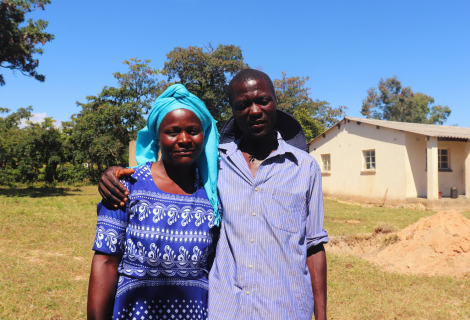A couple’s joy restored through the TORCHES project’s SASA! Methodology

ActionAid Zimbabwe (AAZ) together with its partners Leonard Cheshire Disability, Family AIDS Caring Trust- Zimbabwe (FACT) and Forum for African Women Educationalists Zimbabwe Chapter (FAWEZI) with support from People’s Postcode Lottery are championing the cause for communities where women and girls are free from violence. The partners are using the SASA! model under the Towards Resilient Communities with Health, Equity, and Safety for All (TORCHES) Project.
SASA! Is an acronym that stands for Start, Awareness, Support, and Action which are the four stages of a methodology being used to determine power—what it is, who has it, how it is used, how it is abused, and how power dynamics between women and men can change for the better. SASA demonstrates how understanding power and its effects can help in preventing violence against women and girls (VAWG).
Testifying the impact of the project during the second phase awareness close out, a couple from Ward 27, Nyanga District in Manicaland province of Zimbabwe, shared their experiences of how SASA! has transformed their lives and became gender sensitive.
Girlie Towa (49) narrated how her four children (three boys and a girl) were on the verge of dropping out of school because her husband, Taurai Munetsi (48) was a drunkard who was failing to support her with paying school fees.
“My husband had a strict personality. He didn't do anything at home, he used to get drunk all day and beat me if I asked for money or asked for help with household chores. I felt sorry for my children, they saw me being beaten. Moreover, I was unable to pay their school fees with the little funds I got from my gardening products. When my husband beat me, I would ease my sorrow through singing and writing poems,” said Girlie.
Taurai acknowledged that his drinking habits affected the family adding that he had no desire to help with household chores for fear of being labelled as a weak and bewitched man.
“Growing up, I thought that there are certain chores designated for women and that a man who helped his wife was foolish or had been given love potions. Before the coming of SASA, my wife would do all the household chores without my help, be it ploughing the land, laundry, cooking and fetching firewood. I was not conscious of how this was wrong. I used to assault my wife and she has a huge scar on her back because I hit her with a sharp stick, but to this day I regret doing it,” said Taurai.
After attending the SASA! sessions, Taurai discovered that helping his wife with the chores has not only increased their harvest but has also helped him to spend more time with his family.
“I have learnt a lot from the SASA! sessions, I have reformed to the extent that I no longer drink alcohol. The sessions transformed my way of thinking that violence does not solve problems. We now plan things together as a couple. I even help her with all the chores instead of burdening her, which has now resulted in us having increased yield because as we work as a team, we are able to cultivate a much bigger portion. My children can go to school now,” said Taurai.
Taurai explained that through SASA! he now understands that women have the power to also make family decisions.
The SASA! Together is a community mobilisation approach based on the analysis and understanding of power imbalances as the root cause of VAWG. The awareness phase close-out event exhibited an improved understanding of men’s power over women from the community members in Nyanga.
ENDS